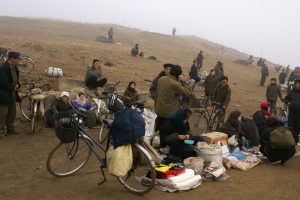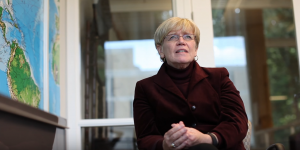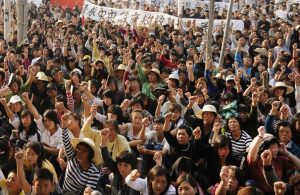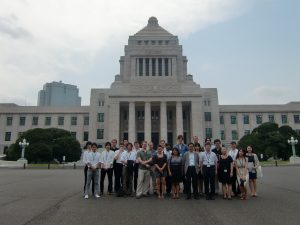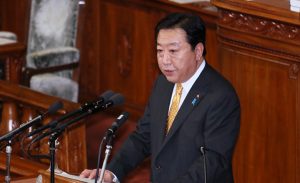‘Normalizing’ same-sex marriage in the US and gay rights in Japan
At first glance, the 2012 Presidential election in the United States may seem to have nothing to do with gay rights in Japan. But President Obama’s reelection may have a significant impact on the future of same-sex marriage in the States, which is likely to create ripple effects in Japan.
Post-socialism, North Korean Style: With State Economy in Ruins, Workers Look Elsewhere for Employment
North Korea is often described as the “world’s last Stalinist state,” but this is misleading. While the facade of a Stalinist economy remains visible in Pyongyang, the nation’s capital, the socialist regime has long become an empty shell. The North Korean economy is now dominated by legal, semi-legal, and entirely illegal private enterprises that provide employment for workers who have failed to make ends meet in the formal economy. As such, it more closely resembles a post-socialist Eastern European economy than a Stalinist one.
Beauty Queens in Post War Japan (Video with Dr. Jan Bardsley)
The study of Japanese beauty queens offers insights into democracy and gender issues in post-war Japan. In the 1905s, Japanese beauty queens were often celebrated as models of democracy. They were confident, willing to travel overseas, and represented the idea of upward social mobility. This captured the imagination of Japanese women and for some, signified a step forward for Japanese women’s rights.
However, women in the beauty contests were constructed as images, only allowed to say certain things and unable to complain. This image of beauty queens belies the true situation of Japanese women in the 1950s who were protesting over a lack of equality.
Collective Protests in China and India: Unexpected Similarity?
Collective protests against corruption and land grabs are widespread in both China and India. The official Chinese Academy of Social Sciences reported that the government spent $110 billion on containing these and related popular protests in 2011, more than the defense budget. Many argue that disruptive protests erupt because there are no effective institutional channels, such as the judiciary, for expressing grievances in China. However, in neighboring India, the world’s biggest democracy where such channels do exist, people similarly express their discontent through disruptive protests. Though not yet systematically counted, disruptions, both violent and non-violent, are an essential characteristic of Indian democracy.
China’s Liberalizing Impact on Global Commodity Markets
Memo #195 – China played a key part in the recent collapse of the iron ore pricing regime. This was an unintended consequence of a mix of bold negotiating tactics and competing domestic interests, which made it difficult to implement a consistent international procurement policy. Chinese actions destabilized global market institutions and paradoxically caused their liberalization.
Upcoming Canada-Japan Economic Partnership Agreement – Lessons Learned from Korea
Memo #192 – Canada and Japan are set to begin negotiations to develop an Economic Partnership Agreement (EPA) on November 26th, 2012. Canada hasn’t completed a preferential trade agreement with any of its Asia Pacific partners, and Japan has yet to finalize an EPA with a G8 country. As negotiations for a Free Trade Agreement (FTA) with Korea have entered their seventh year and as regional competitors, like Australia, are forging new trade partnerships in Asia, Canada feels pressured to assert itself in the region. If Canada can learn from the stalled Korean negotiations, the Canada-Japan EPA can become the platform to accomplish such a task.
Judo in Japanese Schools – Concerns about Safety
Memo #191 – Japan’s prime minister, Shinzo Abe oversaw the revision of the 1947 Fundamental Law of Education to emphasise traditional “Japanese values” in 2006. As one direct result of this, traditional martial arts became compulsory in junior high schools in April 2012. Unlike the initial opposition to the new law, opposition to this particular aspect has not been led by teachers’ unions and their political allies, but by parents concerned about the health and safety of their children.
Senkaku Dispute: the Fallacy of seeing a Monolithic Japanese Government
Memo # 189 – Foreign policy may not be the result of a rational, calculated, and well-coordinated act. Instead, it may stem from messy domestic politics or bureaucratic inertia and oversight. This idea applies to the Japanese government’s actions in the Senkaku dispute, even though critics paint a portrait of a monolithic Japanese government masterminding a Senkaku strategy.
Islamic Roots of Identity in Xinjiang, China
Memo #188 – Among the numerous cultural restrictions aimed at China’s Uyghur population, the Chinese government focuses particularly intently on control of religious activities. This past Ramadan saw an increase in state-imposed restrictions on ordinary Islamic practices among the Uyghurs. Since Beijing proclaims support for a distinct Uyghur identity while suppressing Islamic practices, it is worth reconsidering the historical connections between identity and Islam among the Uyghurs and their ancestors.
Child Trafficking and Local Protectionism in China
Memo # 187 – Child trafficking in China is an explosive issue. Although the precise scale of human trafficking in China is unknown, children are reported to account for about 40 per cent of the total victims – a twofold increase in less than a decade. We assume the demand for child forced labour comes from illegitimate actors. But the surprising and tragic truth is that local government entrepreneurialism taps on the opportunities offered by child forced labour. This is a key contributing factor to this development.

